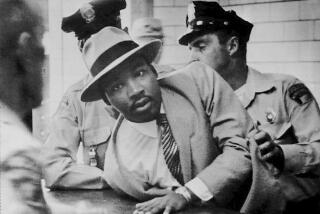Faith, hope and Dr. Seuss too
- Share via
When he was a student at Duke Divinity School, the Rev. James Kemp studied the great theologians of the Christian faith -- the Apostle Paul, St. Augustine, Thomas Aquinas, Martin Luther and John Wesley, founder of the Methodist Church to which Kemp belongs.
But his favorite theologian was the one he first read at the public library in Lexington, Ky.: Dr. Seuss.
His favorite theological work? “Horton Hatches the Egg.”
“It is the first book I remember reading or having read to me,” Kemp recalls in his new book, “The Gospel According to Dr. Seuss.”
Since its publication in February, “The Gospel According to Dr. Seuss” has sold more than 14,000 copies and has headed into a second printing. It got a boost in early March, when Barnes & Noble featured it as part of a national celebration of Dr. Seuss’ birthday on March 2.
During his 15 years as a Methodist minister, Kemp often used Dr. Seuss’ stories as illustrations in his sermons. For example, Horton the elephant, who keeps his promise to sit on a bird’s egg till it hatches -- despite ridicule from those around him -- is a model of faithfulness of Christians, Kemp says.
“In the face of challenges, persecution and ridicule,” he writes, “Horton remains faithful ‘one hundred percent.’ ”
Each chapter focuses on a single Dr. Seuss book, and was condensed from Kemp’s old sermons. “The Cat in the Hat Comes Back” becomes a story about the “restoring power of Jesus Christ,” “Yertle the Turtle” a lesson about greed, “Green Eggs and Ham” a parable about embracing change and “The Sneetches” one about overcoming discrimination.
Two chapters focus on “The Grinch Who Stole Christmas”: one about materialism and another about loving difficult people. Kemp sees a parallel between the Grinch and the biblical story of Jesus and Zacchaeus. Jesus treated Zacchaeus, a despised tax collector, with respect, says Kemp, and completely changed his life.
“If we are to follow Jesus,” he writes, “we too must learn to recognize and love people, who, like the Grinch, are miserable and difficult because they are in so much pain.”
In an e-mail interview from his home in Lexington, Kemp said he likes Dr. Seuss as theologian “because Jesus told us to come as a child, and Dr. Seuss makes us look at things through the eyes of a child.”
Kemp, 48, suffers from severe multiple sclerosis, a condition that forced him to retire from the ministry in 1996. “The Gospel According to Dr. Seuss” is the third book he’s written since then.
The first, “Who Says I’m Dead?,” deals with his struggles with MS, which has made him a quadriplegic. The title comes from an incident in 2000, where Kemp’s bank accounts were frozen after the federal government mistakenly decided he had died. A 2002 book focused on ideas for children’s sermons.
For a time, Kemp wrote using a computer with speech recognition software. His speech has declined so that the computer can no longer recognize him, so he dictates his writing to his mother, who acts as his secretary. His wife, Barbara, interprets for Kemp during interviews.
He says he wrote the book to show that people with great limitations can still be productive, as long as they have the right support system. He says he relies on his faith, family and church friends to help him keep going, despite his circumstances.
Hope is another of the themes Kemp finds in Dr. Seuss. One of his favorite characters is the Cat in the Hat, he says, “because through him we see that something good can come out of bad circumstances; we are never hopeless.” That’s the overall message of the book, he adds.
“There is always hope,” Kemp said. “There is always hope in the unlimited richness of God. Most of our problems are trivial.”
Since the publication of “The Gospel According to Peanuts” by Robert L. Short in 1975, there’ve been a number of similar books that combine spirituality with pop culture. There have been “Gospels According to” the Simpsons, Tony Soprano, J.R.R. Tolkien, Harry Potter and even “The Gospel Reloaded,” which tied into the Matrix phenomenon.
And then there’s the 2003 spoof, “The Gospel According to Biff, Christ’s Childhood Pal.”
Linda Peavy, associate publisher for Judson Press, Kemp’s publisher, says the book connects with readers because so many grew up reading Dr. Seuss.
“This book will appeal to readers because it is easy and enjoyable to read,” she says, “but also because it contains insights that will change their lives for the better. Hopefully, they will see Dr. Seuss’ stories in a whole new light.”
Kemp says that he enjoys the attention the book’s success has brought him -- “I’ve always liked attention,” he admits -- and that it allows him to continue his ministry. He’s even done a few book signings, with his wife stamping his signature.
During a signing at a bookstore in Lexington, the store sold 75 copies in 15 minutes and had to order 100 additional copies.
But the signings will be limited, Barbara Kemp says. The physical toll is just too much for James Kemp’s limited stamina.
Still, he hasn’t given up on being a famous author. “One of my lifetime goals was to be on the bestsellers list,” he told the Kansas City Star, “and I hope I can do that.”
More to Read
Sign up for our Book Club newsletter
Get the latest news, events and more from the Los Angeles Times Book Club, and help us get L.A. reading and talking.
You may occasionally receive promotional content from the Los Angeles Times.









